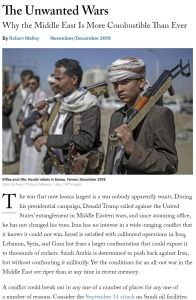Join getAbstract to access the summary!

Join getAbstract to access the summary!
Robert Malley
The Unwanted Wars
Why the Middle East Is More Combustible Than Ever
Foreign Affairs, 2019
What's inside?
Nothing stays local in the Middle East.
Recommendation
The Middle East never stays out of the news for long. Unresolved regional conflicts, ethnic sectarianism, age-old religious rifts and foreign power-play accentuate the region’s notorious volatility. Yet as Robert Malley, CEO of the International Crisis Group, argues, Middle East tensions today are nearing a boiling point. Malley dissects the many factors that have brought the region to this point. He paints a map of the complexities of contemporary Middle Eastern politics in an essay that is packed with nuance.
Summary
About the Author
Robert Malley is President and CEO of the International Crisis Group. During the Obama administration, he served as Special Assistant to the President, White House Middle East Coordinator, and Senior Adviser on countering the Islamic State.
















Comment on this summary